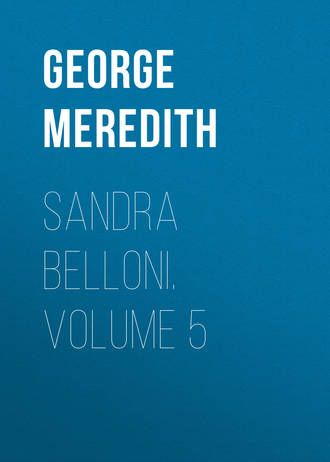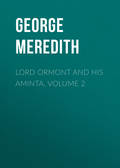
George Meredith
Sandra Belloni. Volume 5
"I would repeat anything that would give you pleasure to hear."
"Sometimes pain, you know, is sweet."
Little by little, and with a contest at each step, Georgiana coasted the conviction that her undivided reign was over. Then she judged Emilia by human nature's hardest standard: the measure of the qualities brought as usurper and successor. Unconsciously she placed herself in the seat of one who had fulfilled all the great things demanded of a woman for Merthyr, and it seemed to her that Emilia exercised some fatal fascination, girl though she was, to hurl her from that happy sovereignty.
But Emilia's worst crime before the arraigning lady was that Wilfrid had cast her off. Female justice, therefore, said: "You must be unworthy of my brother;" and female delicacy thought: "You have been soiled by a previous history." She had pitied Wilfrid: now she held him partially blameless: and while love was throbbing in many pulses all round her. The man she had seen besieged by passionate love, touched her cold imagination with a hue of fire, as Winter dawn lies on a frosty field. She almost conceived what this other, not sisterly, love might be; though not as its victim, by any means. She became, as she had never before been, spiritually tormented and restless. The thought framed itself that Charlotte and Wilfrid were not, by any law of selection, to match. What mattered it? Simply that it in some way seemed to increase the merits of one of the two. The task, moreover, of avoiding to tease her brother was made easier to her by flying to this new refuge of mysterious reflection. At times she poured back the whole flood of her heart upon Merthyr, and then in alarm at the host of little passions that grew cravingly alive in her, she turned her thoughts to Wilfrid again; and so, till they turned wittingly to him. That this host of little passions will invariably surround a false great one, she learnt by degrees, by having to quell them and rise out of them. She knew that now she occasionally forced her passion for Merthyr; but what nothing could teach her was, that she did so to eject another's image. On the contrary, her confession would have been: "Voluntarily I dwell upon that other, that my love for Merthyr may avoid excess." To such a state of clearness much self-questioning brought her: but her blood was as yet unwarmed; and that is a condition fostering self-deception as much as when it rages.
Madame Marini wrote to ask whether Emilia might receive the visits of a Sir Purcell Barrett, whom they had met, and whom Emilia called her friend; adding: "The other gentleman has called at our old lodgings three times. The last time our landlady says, he wept. Is it an Englishman, really?"
Merthyr laughed at this, remarking: "Charlotte is not so vigilant, after all."
"He wept." Georgiana thought and remembered the cold self-command that his face had shown when Emilia claimed him, and his sole reply was, "I am engaged to this lady," designating Lady Charlotte. Now, too, some of Emilia's phrases took life in her memory. She studied them, thinking over them, as if a voice of nature had spoken. Less and less it seemed to her that a woman need feel shame to utter them. She interpreted this as her growth of charity for a girl so violently stricken with love. "In such a case, the more she says the more is she to be excused; for nothing but a frenzy of passion could move her to speak so," thought Georgiana. Accepting the words, and sanctioning the passion, the person of him who had inspired it stood magnified in its light. She believed that if he had played with the girl, he repented, and the idea of a man shedding tears burnt to her heart.
Merthyr and Georgiana remained in Devonshire till a letter from Madame
Marini one morning told them that Emilia had disappeared.
"You delayed too long to go to her, Merthyr," said his sister, astonishing him. "I understand why; but you may trust to time and scorn chance too much. Let us go now and find her, if it is not too late."
Marini met them at the station in London, and they heard that Wilfrid had discovered Marini's new abode, and had called there that morning. "I had my eye on him. It was not a piece of love-play," said Marini: "and today she should have seen my Chief, which would have cured her of sis pestilence of a love, to give her sublime thoughts. Do you love her, Miss Ford? Aha! it will be Christian names in Italy again."
"I like her very much," said Georgiana; "but I confess it mystifies me to see you all so excited about her. It must be some attraction possessed by her—what, I cannot say. I like her, certainly."
"Figlia mia! she is an element—she is fire!" said Marini. "My sought, when our Mertyr brought her, was, it is Italy he sees in her face—her voice—name—anysing! And a day passed, and I could not lose her for my own sake, and felt a somesing, too! She is half man."
"A singular reason for an attraction." Georgiana smiled.
"She is not," Marini put out his fingers like claws to explain, while his eyelashes met over his eyes—"she is not what man has made of your sex; and she is brave of heart."
"Can you possibly tell what such a child can be?" questioned Georgiana, almost irritably.
Marini did not reply to her.
"A face to find a home in!—eh, Mertyr?"
"Let's discover where that face has found a home," said Merthyr. "She is a very plain and unpretending person, if people will not insist upon her being more. This morbid admiration of heroines puts a trifle too much weight upon their shoulders, does it not?"
Georgiana knew that to call Emilia 'child' was to wound the most sensitive nerve in Merthyr's system, if he loved her, and she had determined to try harshly whether he did. Nevertheless, though the expression succeeded, and was designedly cruel, she could not forgive the insincerity of his last speech; craving in truth for confidence as her smallest claim on him now. So, at all the consultations, she acquiesced in any scheme that was proposed; the advertizings and the use of detectives; the communication with Emilia's mother and father; and the callings at suburban concert-rooms. Sir Purcell Barrett frequently called to assist in the discovery. At first he led them to suspect Mr. Pericles; but a trusty Italian playing spy upon that gentleman soon cleared him, and they were more in the dark than ever. It was only when at last Georgiana heard Merthyr, the picture of polished self-possession, giving way to a burst of disappointment in the room before them all: "Are we sure that she lives?" he cried:—then Georgiana, looking at the firelight over her joined fingers, said:—
"But, have you forgotten the serviceable brigade you have in your organ- boys, Marini? If Emilia sees one, be sure she will speak to him."
"Have I not said she is a General?" Marini pointed at Georgiana with a gleam of his dark eyes, and Merthyr squeezed his sister's hand, thanking her; by which he gave her one whole night of remorse, because she had not spoken earlier.
CHAPTER XXXVIII
"My voice! I have my voice!"
Emilia had cried it out to herself almost aloud, on the journey from Devon to London. The landscape slipping under her eyes, with flashing grey pools and light silver freshets, little glades, little copses, farms, and meadows rounding away to spires of village churches under blue hills, would not let her sink, heavy as was the spirit within her, and dead to everything as she desired to be. Here, a great strange old oak spread out its arms and seemed to hold the hurrying train a minute. When gone by, Emilia thought of it as a friend, and that there, there, was the shelter and thick darkness she had hoped she might be flying to. Or the reach of a stream was seen, and in the middle of it one fair group of clouds, showing distance beyond distance in colour. Emilia shut her sight, and tried painfully to believe that there were no distances for her. This was an easy task when the train stopped. It was surprising to her then why the people moved. The whistle of the engine and rush of the scenery set her imagination anew upon the horror of being motionless.
"My voice! I have my voice!" The exclamation recurred at intervals, as a quick fear, that bubbled up from blind sensation, of her being utterly abandoned, and a stray thing carrying no light, startled her. Darkness she still had her desire for; but not to be dark in the darkness. She looked back on the recent night as a lake of fire, through which she had plunged; and of all the faculties about her, memory had suffered most, so that it could recall no images of what had happened, but lay against its black corner a shuddering bundle of nerves. The varying fields and woods and waters offering themselves to her in the swiftness, were as wine dashed to her lips, which could not be dead to it. The wish to be of some worth began a painful quickening movement. At first she could have sobbed with the keen anguish that instantaneously beset her. For—"If I am of worth, who looks on me?" was her outcry, and the darkness she had previously coveted fell with the strength of a mace on her forehead; but the creature's heart struggled further, and by-and-by in despite of her the pulses sprang a clear outlook on hope. It struck through her like the first throb of a sword-cut. She tried to blind herself to it; the face of hope was hateful.
This conflict of the baffled spirit of youth with its forceful flood of being continued until it seemed that Emilia was lifted through the fiery circles into daylight; her last cry being as her first: "I have my voice!"
Of that which her voice was to achieve for her she never thought. She had no thought of value, but only an eagerness to feel herself possessor of something. Wilfrid had appeared to her to have taken all from her, until the recollection of her voice made her breathe suddenly quick and deep, as one recovering the taste of life.
Despair, I have said before, is a wilful business, common to corrupt blood, and to weak woeful minds: native to the sentimentalist of the better order. The only touch of it that came to Emilia was when she attempted to penetrate to Wilfrid's reason for calling her down to Devon that he might renounce and abandon her. She wanted a reason to make him in harmony with his acts, and she could get none. This made the world look black to her. But, "I have my voice!" she said, exhausted by the passion of the night, tearless, and only sensible to pain when the keen swift wind, and the flying squares of field and meadow prompted her nature mysteriously to press for healthy action.
A man opposite to her ventured a remark: "We're going at a pretty good pace now, miss."
She turned her eyes to him, and the sense of speed was reduced in her at once, she could not comprehend how. Remembering presently that she had not answered him, she said: "It is because you are going home, perhaps, that you think it fast."
"No, miss," he replied, "I'm going to market. They can't put on steam too stiff for me when I'm bound on business."
Emilia found it impossible to fathom the sensations of the man, and their common desire for speed bewildered her more. She was relieved when the train was lightened of him. Soon the skirts of red vapour were visible, and when the guard took poor Braintop's return-ticket from her petulant hand, all of the journey that she bore in mind was the sight of a butcher-boy in blue, with a red cap, mounted on a white horse, who rode gallantly along a broad highroad, and for whom she had struck out some tune to suit the measure of his gallop.
She accepted her capture by the Marinis more calmly than Merthyr had been led to suppose. The butcher-boy's gallop kept her senses in motion for many hours, and that reckless equestrian embodied the idea of the vivifying pace from which she had dropped. He went slower and slower. By degrees the tune grew dull, and jarred; and then Emilia looked out on the cold grey skies of our autumn, the rain and the fogs, and roaring London filled her ears. So had ended a dream, she thought. She would stand at the window listening to street-organs, whose hideous discord and clippings and drawls did not madden her, and whose suggestion of a lovely tune rolled out no golden land to her. That treasure of her voice, to which no one in the house made allusion, became indeed a buried treasure.
In the South-western suburb where the Marinis lived, plots of foliage were to be seen, and there were lanes not so black but that they showed the hues of the season. These led to the parks and to noble gardens. Emilia daily went out to keep the dying colours of the year in view, and walked to get among the trees, where, with Madame attendant on her, she sat counting the leaves as each one curved, and slid, and spun to earth, or on a gust of air hosts went aloft; but it always ended in their coming down; Emilia verified that fact repeatedly. However high they flew, the ground awaited them. Madame entertained her with talk of Italy, and Tuscan wine, and Lombard bread, and Turin chocolate. Marini never alluded to his sufferings for the loss of these cruelly interdicted dainties, never! But Madame knew how his exile affected him. And in England the sums one paid for everything! "One fancies one pays for breath," said Madame, shivering.
One day the ex-organist of Hillford Church passed before them. Emilia let him go. The day following he passed again, but turned at the end of the alley and simulated astonishment at the appearance of Emilia, as he neared her. They shook hands and talked, while Madame zealously eyed any chance person promenading the neighbourhood. She wrote for instructions concerning this gentleman calling himself Sir Purcell Barrett, and receiving them, she permitted Emilia to invite him to their house. "He is an Englishman under a rope, ready for heaven," Madame described him to her husband, who, though more at heart with Englishmen, could not but admit that this one wore a look that appeared as a prognostication of sadness.
Sir Purcell informed Emilia of his accession to title; and in reply to her "Are you not glad?" smiled and said that a mockery could scarcely make him glad; indicating nevertheless how feeble the note of poverty was in his grand scale of sorrow. He came to the house and met them in the gardens frequently. With some perversity he would analyze to herself Emilia's spirit of hope, partly perhaps for the sake of probing to what sort of thing it might be in its nature and defences; and, as against an accomplished disputant she made but a poor battle, he injured what was precious to her without himself gaining any good whatever.
"Why, what do you look forward to?" she said wondering, at the end of one of their arguments, as he courteously termed this play of logical foils with a baby.
"Death," answered the grave gentleman, striding on.
Emilia pitied him, thinking: "I might feel as he does, if I had not my voice." Seeing that calamity very remote, she added: "I should!"
She knew of his position toward Cornelia: that is, she knew as much as he did: for the want of a woman's heart over which to simmer his troubles was urgent within him and Emilia's, though it lacked experience, was a woman's regarding love. And moreover, she did not weep, but practically suggested his favourable chances, which it was a sad satisfaction to him to prove baseless, and to knock utterly over. The grief in which the soul of a human creature is persistently seeking (since it cannot be thrown off) to clothe itself comfortably, finds in tears an irritating expression of sympathy. Hints of a brighter future are its nourishment. Such embryos are not tenacious of existence, and when destroyed they are succulent food for a space to the moody grief I am describing.
The melancholy gentleman did Emilia this good, that, never appearing to imagine others to know misery save himself, he gave her full occupation apart from the workings of her own mind. As to her case, he might have offered the excuse that she really had nothing of the aspect of a lovesick young lady, and was not a bit sea-green to view, or lamentable in tone. He was sufficiently humane to have felt for anyone suffering, and the proof of it is, that the only creature he saw under such an influence he pitied so deplorably, as to make melancholy a habit with him. He fretted her because he would do nothing, and this spectacle of a lover beloved, but consenting to be mystified, consentingly paralyzed:– of a lover beloved!—
"Does she love you?" said Emilia, beseechingly.
"If the truth is in her, she does," he returned.
"She has told you she loves you?—that she loves no one else?"
"Of this I am certain."
"Then, why are you downcast? my goodness! I would take her by the hand 'Woman; do you know yourself? you belong to me!'—I would say that; and never let go her hand. That would decide everything. She must come to you then, or you know what it is that means to separate you. My goodness! I see it so plain!"
But he declined to look thus low, and stood pitifully smiling:—This spectacle, together with some subtle spur from the talk of love, roused Emilia from her lethargy. The warmth of a new desire struck around her heart. The old belief in her power over Wilfrid joined to a distinct admission that she had for the moment lost him; and she said, "Yes; now, as I am now, he can abandon me:" but how if he should see her and hear her in that hushed hour when she was to stand as a star before men? Emilia flushed and trembled. She lived vividly though her far-projected sensations, until truly pity for Wilfrid was active in her bosom, she feeling how he would yearn for her. The vengeance seemed to her so keen that pity could not fail to come. Thus, to her contemplation, their positions became reversed: it was Wilfrid now who stood in the darkness, unselected. Her fiery fancy, unchained from the despotic heart, illumined her under the golden future.
"Come to us this evening, I will sing to you," she said, and the
'Englishman under a rope' bowed assentingly.
"Sad songs, if you like," she added.
"I have always thought sadness more musical than mirth," said he.
"Surely there is more grace in sadness!"
Poetry, sculpture, and songs, and all the Arts, were brought forward in mournful array to demonstrate the truth of his theory.
When Emilia understood him, she cited dogs and cats, and birds, and all things of nature that rejoiced and revelled, in support of the opposite view.
"Nay, if animals are to be your illustration!" he protested. He had been perhaps half under the delusion that he spoke with Cornelia, and with a sense of infinite misery, he compressed the apt distinction that he had in his mind; which was to show where humanity and simple nature drew a line, and wherein humanity claimed the loftier seat.
"But such talk must be uttered to a soul," he phrased internally, and
Emilia was denied what belonged to Cornelia.
Hitherto Emilia had refused to sing, and Madame Marini, faithful to her instructions, had never allowed her to be pressed to sing. Emilia would brood over notes, thinking: "I can take that; and that; and dwell on such and such a note for any length of time;" but she would not call up her voice; she would not look at her treasure. It seemed more to her, untouched; and went on doubling its worth, until doubtless her idea of capacity greatly relieved her of the burden on her breast, and the reflection that she held a charm for all, and held it from all, flattered one who had been cruelly robbed.
On their way homeward, among the chrysanthemums in the long garden-walk, they met Tracy Runningbrook, between whose shouts of delight and Emilia's reserve there was so marked a contrast that one would have deemed Tracy an offender in her sight. She had said to him entreatingly, "Do not come," when he volunteered to call on the Marinis in the evening; and she got away from him as quickly as she could, promising to be pleased if he called the day following. Tracy flew leaping to one of the great houses where he was tame cat. When Sir Purcell as they passed on spoke a contemptuous word of his soft habits and idleness, Emilia said: "He is one of my true friends."
"And why is he interdicted the visit this evening?"
"Because," she answered, and grew pale, "he—he does not care for music.
I wish I had not met him."
She recollected how Tracy's flaming head had sprung up before her—he who had always prophesied that she would be famous for arts unknown to her, and not for song just when she was having a vision of triumph and caressing the idea of her imprisoned voice bursting its captivity, and soaring into its old heavens.
"He does not care for music!" interjected Sir Purcell, with something like a frown. "I have nothing in common with him. But that I might have known. I can have nothing in common with a man who is not to be impressed by music."
"I love him quite as well," said Emilia. "He is a quick friend. I am always certain of him."
"And I imagine also that you are quits with your quick friend," added
Sir Purcell. "You do not care for verse, or he for voices!"
"Poetry?" said Emilia; "no, not much. It seems like talking on tiptoe; like animals in cages, always going to one end and back again…."
"And making the same noise when they get at the end—like the bears!" Sir
Purcell slightly laughed. "You don't approve of the rhymes?"
"Yes, I like the rhymes; but when you use words—I mean, if you are in earnest—how can you count and have stops, and—no, I do not care anything for poetry."
Sir Purcell's opinion of Emilia, though he liked her, was, that if a genius, she was an incomplete one; and his positive judgement (which I set down in phrase that would have startled him) ranked both her and Tracy as a pair of partial humbugs, entertaining enough. They were both too real for him.
Haply at that moment the girl was intensely susceptible, for she chilled by his side; and when he left her she begged Madame to walk fast. "I wonder whether I have a cold!" she said.
Madame explained all the signs of it with tragic minuteness, deciding that Emilia was free at present, and by miracle, from this English scourge; but Emilia kept her hands at her mouth. Over the hornbeam hedge of the lane that ran through the market-gardens, she could see a murky sunset spreading its deep-coloured lines, that seemed to her really like a great sorrowing over earth. It had never seemed so till now; and, entering the house, the roar of vehicles in a neighbouring road sounded like something implacable in the order of things among us, and clung about her ears pitilessly. Running upstairs, she tried a scale of notes that broke on a cough. "Did I cough purposely?" she asked herself; but she had not the courage to try the notes again. While dressing she hummed a passage, and sought stealthily to pass the barrier of her own watchfulness by dwelling on a deep note, from which she was to rise bursting with full bravura energy, and so forth on a tide of song. But her breath failed. She stared into the glass and forced the note. A panic caught at her heart when she heard the sound that issued. "Am I ill? I must be hungry!" she exclaimed. "It is a cough! But I don't cough! What is the matter with me?"
Under these auspices she forced her voice again, and subsequently loosened her dress, complaining of the dressmaker's affection for tightness. "Now," she said, having fallen upon an attempt at simple "do, re, me, fa," and laughed at herself. Was it the laugh, that stopping her at "si," made that "si" so husky, asthmatic, like the wheezing of a crooked old witch? "I am unlucky, to-night," said Emilia. Or, rather, so said her surface-self. The submerged self—self in the depths—rarely speaks to the occasions, but lies under calamity quietly apprehending all; willing that the talker overhead should deceive others, and herself likewise, if possible. Emilia found her hands acting daintily and critically in the attirement of her person; and then surprised herself murmuring: "I forgot that Tracy won't be here to-night." By which she betrayed that she had divined those arts she was to shine in, according to Tracy; and betrayed that she had a terrible fear of a loss of all else. It pained her now that Tracy should not be coming. "Can I send for him?" she thought, as she looked winningly into the glass, trying to feel what sort of a feeling it was to be in love with a face like that one fronting her, so familiar in its aspects, so strange when scrutinized studiously! She drew a chair, and laying her elbow on the toilet-table, gazed hard, until the thought: "What face did Wilfrid see last?" (meaning, "when he saw me last") drove her away.
Not only did she know herself now a face of many faces; but the life within her likewise as a soul of many souls. The one Emilia, so unquestioning, so sure, lay dead; and a dozen new spirits, with but a dim likeness to her, were fighting for possession of her frame, now occupying it alone, now in couples; and each casting grim reflections on the other. Which is only a way of telling you that the great result of mortal suffering—consciousness—had fully set in; to ripen; perhaps to debase; at any rate, to prove her.
To be of worth was still her fixed idea—all that was clear in the thickening mist. "I cannot be ugly," she said, and reproved herself for simulating a childish tone. "Why do I talk in that way? I know I am not ugly. But if a fire scorched my face? There is nothing that seems safe!" The love of friends was suggested to her as something to rely on; and the loving them. "But if I have nothing to give!" said Emilia, and opened both her empty hands. She had diverted her mind from the pressure upon it, by this colloquy with a looking-glass, and gave herself a great rapture by running up notes to this theme:—
"No, no, no, no, no!—nothing! nothing!"
Clear, full, sonant notes; the notes of her true voice. She did not attempt them a second time; nor, when Sir Purcell requested her to sing in the course of the evening, did she comply. "The Signora thinks I have a cold," she said. Madame Marini protested that she hoped not, she even thought not, though none could avoid it at this season in this climate, and she turned to Sir Purcell to petition for any receipts he might have in his possession, specifics for warding off the frightful affliction of households in England.
"I have now twenty," said Madame, and throwing up her eyes; "I have tried all! oh! so many lozenge!"







